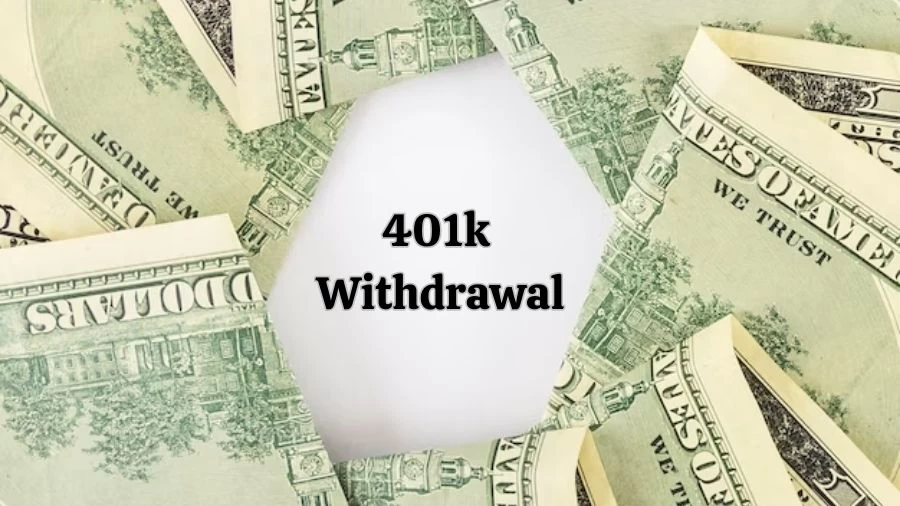
401k Withdrawal Rules, What Age Allows Tax-Free 401k Withdrawals?
401(k) Withdrawals involve potential penalties and taxes, emphasizing the importance of understanding rules and seeking guidance for informed decisions on accessing retirement funds early.
by Kowsalya
Published Aug 11, 2023 | Updated Jan 29, 2024 | 📖 5 min read
What is 401k Withdrawal?
Withdrawing funds early from a 401(k) can incur a 10% early distribution tax, along with ordinary income taxes. While possible, penalty-free withdrawals are limited, including hardship situations, leaving a job at 55 or later, a divorce settlement, domestic abuse survivorship, terminal illness, disability, birth or adoption, disaster victim status, and more.
Converting a 401(k) to an IRA may provide flexibility, avoiding the early withdrawal penalty. However, experts caution against cashing out a 401(k) for non-emergencies, as it may lock in losses, hinder future growth, and lead to tax implications. It's crucial to consider the long-term impact before making such decisions.
What are the 401k Withdrawal Rules?
Navigating 401(k) withdrawal rules is crucial for retirees and those considering accessing their funds. Understanding the age-based eligibility, taxation nuances, and distribution options ensures informed decisions for maximizing retirement savings.
Qualified Distributions After Age 59½
Individuals can make qualified distributions from their 401(k) without facing the 10% early withdrawal penalty once they reach the age of 59½. This allows retirees to access their funds without additional tax burdens.
Exception for Age 55
In certain cases, if an individual retires or loses their job at age 55 but is not yet 59½, they can avoid the 10% early withdrawal penalty for the 401(k) from their most recent employer. However, funds from previous employers' plans or IRAs may not qualify for this exception.
Distribution Options
After reaching the eligible age, individuals can choose between different distribution options, such as regular annuities for a fixed period or lifetime, nonperiodic lump-sum withdrawals, or other alternatives based on their company's rules.
Taxation of Distributions
Distributions from traditional 401(k)s are subject to ordinary income tax, as the contributions were made before tax. Roth 401(k) accounts, where contributions have already been taxed, offer tax-free withdrawals, provided the account holder is over 59½ and the account has been held for at least five years.
Delaying Distributions
Retirees are not obligated to take immediate distributions from their 401(k)s. While contributions cannot continue, the account can remain invested, allowing for potential growth. Distributions trigger taxation, so delaying them can defer tax obligations.
Required Minimum Distributions (RMDs)
Starting at age 73 (or 75 for those born in 1960 or later), retirees with a 401(k) must begin taking required minimum distributions (RMDs). These distributions are calculated based on life expectancy and account balance.
Converting to an IRA
To continue contributing after leaving a job, individuals can roll over their 401(k) into an Individual Retirement Account (IRA). This provides flexibility and allows contributions as long as there is earned income.
Traditional IRA vs. Roth IRA
Distributions from traditional IRAs and 401(k)s are subject to normal income tax rates. In contrast, Roth IRAs offer tax-free withdrawals after age 59½, with no RMD requirements.
Handling Small Balances
For 401(k) balances below $5,000, the company may trigger a lump-sum distribution. If the account has $1,000 to $5,000, the funds may be rolled over into an IRA unless the account holder opts for a lump-sum payment.
Expert Guidance
Given the complexity of rules and potential tax implications, individuals are advised to consult with their company's plan administrator or a financial advisor before making significant decisions regarding their 401(k) withdrawals and rollovers.
MarketsHost is here to help you with Taxes and more. Access expert advice and stay up-to-date.
What Age Allows Tax-Free 401k Withdrawals?
The age at which 401(k) withdrawals become tax-free depends on the type of 401(k) account you hold. In a Roth 401(k), withdrawals can potentially be tax-free if the account has been established for at least five years and you are age 59½ or older.
Contributions to a Roth 401(k) are made using after-tax income, so the earnings in the account can be withdrawn without incurring additional taxes if you meet these criteria. However, it's important to note that the rules surrounding Roth 401(k) distributions are nuanced, and other factors, such as the timing and manner of withdrawals, can also impact the tax treatment.
On the other hand, with a traditional 401(k), withdrawals are generally subject to taxes as ordinary income, regardless of age. Contributions to a traditional 401(k) are made using pre-tax dollars, reducing your taxable income at the time of contribution.
How to Withdraw Money From a 401(K) Early?
Making an early withdrawal from a 401(k) can seem like a tempting solution to financial challenges, but it comes with significant consequences. There are two main types of 401(k)s—traditional and Roth—each with its tax implications. Traditional 401(k) withdrawals before the age of 59½ can lead to income tax and a 10% penalty, while Roth 401(k) withdrawals have different rules.
Hardship withdrawals, loans, and new provisions under the SECURE Act 2.0 offer alternatives, but each has its own set of considerations and impacts on your retirement savings. Before taking any action, it's crucial to understand the potential financial implications and explore alternatives to mitigate the long-term impact on your retirement fund.
401k Withdrawal Rules - FAQs
1. Can I withdraw from my 401(k) before age 59½ without penalties?
Generally, early withdrawals before age 59½ incur a 10% penalty, but certain exceptions like hardships or age 55 rule may apply.
2. What is the Secure 2.0 Act and its impact on withdrawals?
The Secure 2.0 Act introduces provisions for emergency distributions and suggests converting a 401(k) to an IRA to avoid penalties.
3. Under what circumstances can I make penalty-free early withdrawals?
Situations include disabilities, medical expenses, eviction prevention, funeral expenses, principal residence purchase, education costs, court-ordered distribution, military duty, birth/adoption, age 55 rule, or SEPP.
4. Can I avoid the 10% penalty if I leave my job?
Yes, if you leave your job during or after the year you turn 55, you can withdraw without penalties.
5. Can I withdraw from a 401(k) for medical bills?
Yes, if medical expenses exceed a certain percentage of your income, you can withdraw without penalties.
6. What happens if I make an early withdrawal from my 401(k)?
You might face a 10% penalty plus regular income taxes, but certain exceptions apply.




